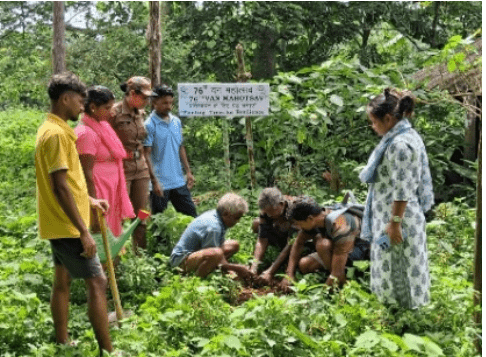Sri Vijaya Puram: The 76th Van Mahotsav was celebrated with a series of coordinated plantation drives across the Andaman and Nicobar Islands on July 9, as officials, staff, and local communities marked the onset of the monsoon season with tree planting activities. The celebrations took place at Chidiyatapu Biological Park and Nayashar Range, focusing on ecological restoration, biodiversity conservation, and rural livelihood support.
At the Biological Park in Chidiyatapu, forest staff planted Jamun (Syzygium spp.) and coastal Poon (Calophyllum spp.) tree species in vacant forest patches and along shoreline areas. The Jamun trees are expected to serve as a food source for native and migratory bird species, especially endemic pigeons, while the Poon trees, considered difficult to establish naturally in coastal belts, have been selected for their potential as sustainable timber species over time.
In parallel, outreach activities were conducted at Chidiyatapu village, where the forest team distributed citrus saplings including lemon, orange, and guava to local residents. These were planted in backyards in collaboration with villagers, who were also encouraged to maintain and expand fruit-bearing tree cover to supplement household nutrition and income.
Officials highlighted the long-term livelihood potential of home-grown citrus crops and reiterated that free distribution of both ornamental and fruit-bearing seedlings would continue through the month of July, as part of the Forest Department’s community engagement programme.
Meanwhile, in a separate plantation event at the Range Office of Nayashar under the Working Plan Division, a total of 35 saplings were planted by forest officials and support staff. The event was led by senior officers from the Department of Environment and Forests and attended by executive, ministerial, and industrial staff of the division.
Addressing the gathering, the Chief Conservator of Forests (Research & Working Plan / Wildlife) drew attention to the year’s Van Mahotsav theme, ‘Ek Ped Maa Ke Naam 2.0’, calling on departments under the Andaman and Nicobar Administration to support afforestation efforts across the territory. He noted that several divisions within the Forest Department were actively contributing to the green drive, and urged coordinated efforts to amplify its impact.
The Deputy Conservator of Forests (Working Plan) stressed the ecological functions of trees in stabilising soil, preventing erosion, producing oxygen, and contributing to overall environmental health. He underscored the broader goals of the Van Mahotsav campaign: building awareness around tree planting, encouraging community ownership of green spaces, and fostering ecological resilience.
The plantation at Nayashar included a mix of avenue species and fruit-bearing trees suited to the island’s climate. By integrating environmental action with symbolic acts of dedication, such as tree planting in honour of mothers, as per this year’s theme, organisers sought to deepen the emotional and social significance of the campaign.
Van Mahotsav, which has been observed annually since 1950, marks the beginning of India’s monsoon afforestation efforts and remains a key fixture in the environmental calendar. In the context of the Andaman and Nicobar Islands, where biodiversity is high but land use pressures are increasing, the campaign serves both as a conservation exercise and a public education opportunity.
Officials said the momentum built during Van Mahotsav would be carried forward through ongoing planting initiatives in forest divisions, schools, and community areas through July and August. The Forest Department is also considering additional village-level outreach to expand participation in backyard planting schemes, especially among tribal and coastal communities.
While the island chain continues to grapple with issues such as deforestation, land degradation, and rising temperatures, campaigns like Van Mahotsav aim to push the conversation, and action, toward greener, community-led solutions.





